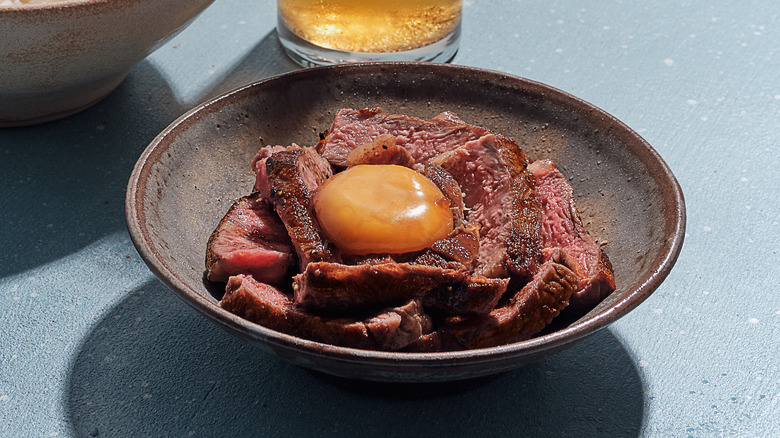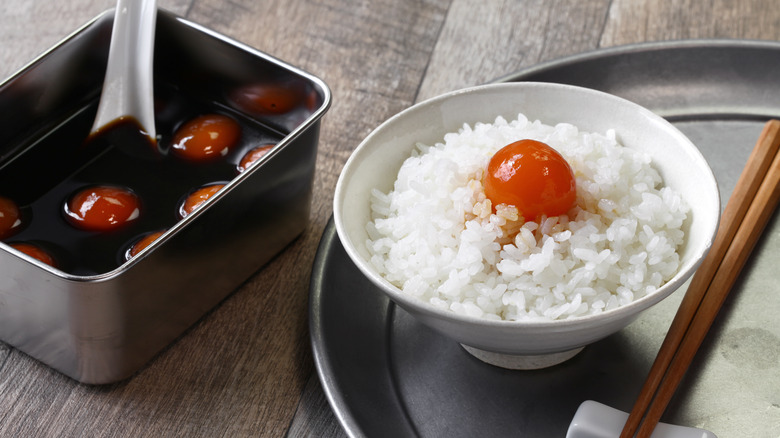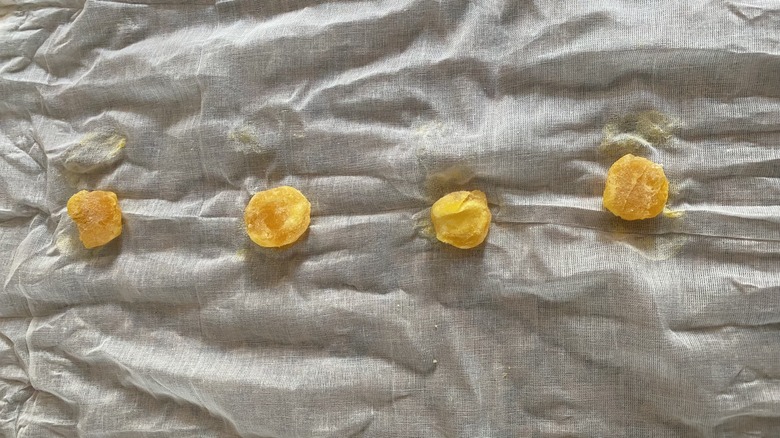Cure Your Egg Yolks In Soy Sauce For An Extra Umami Punch
Eggs are one of the great culinary equalizers — they're generally affordable, dairy-free, vegetarian protein sources that can be used in just about any cuisine, in dishes as varied as a savory egg custard and an ultimate chocolate cake. But while generally eggs are used whole, with both the yolk and white together, sometimes you find yourself with an abundance of one or the other. Let's say you're making macarons or an egg white omelet, and end up with a bunch of egg yolks you don't know what to do with. Raw egg yolks only last for about two days in the fridge, so you'd better use them up quickly.
One of the absolute best ways to use egg yolks is to cure them in soy sauce. Not only will they last longer, but they will take on a rich umami flavor and a unique texture that make them a great topping for rice bowls or other simple dishes that need a bit of elevation.
Soy sauce cured egg yolks
Curing eggs in soy sauce has its history in salt curing eggs — technically, it is the salt in the soy sauce that spurs the fermentation. But soy sauce curing is far easier and faster. While salt curing takes about a week, you can cure egg yolks in soy sauce in as little as four hours. In fact, depending on how soy-rich you want them, you don't really need to let them cure for more than 24 hours. Instead of the cheese-like texture of salt-cured yolks, you will end up with yolks that are jammy and great to spread on bread, eat over a steaming bowl of noodles, or anything you want to add a creamy, umami burst to.
The flavor, however, is going to be quite potent. You can even punch it up by adding other ingredients to the soy sauce marinade, like kombu, ginger, garlic, or mirin. These make for a great topping on a rice bowl. Consider topping with furikake, bonito flakes, or crispy fried shallots for an umami-packed treat that's easy to make and enjoy. Better still — the marinade works as a flavorful sauce as well.
Salt curing egg yolks
Salt-curing eggs is a practice that has been around since at least the fifth century A.D. when it was used for preserving duck eggs in China. The practice was repopularized in Hong Kong and Singapore around 2010 before going global in the mid-2010s. While it has both sweet and savory applications, it is frequently found in Asian pastries around the world, from Antoinette's salted egg yolk croissant in Singapore to Butterboy Baking Co's black sesame salted egg yolk cream puffs in New York.
Salt-curing egg yolks is accomplished by covering them entirely in salt, and then allowing them to ferment for a week in the fridge before air-drying them, usually by hanging them in cheesecloth. The result is a hard, extremely salty yolk that is often grated over pasta and other dishes as a replacement for Parmesan. They taste best in small amounts, due to the high salt content, so you're better off grating them rather than trying to eat them whole or in slices.



